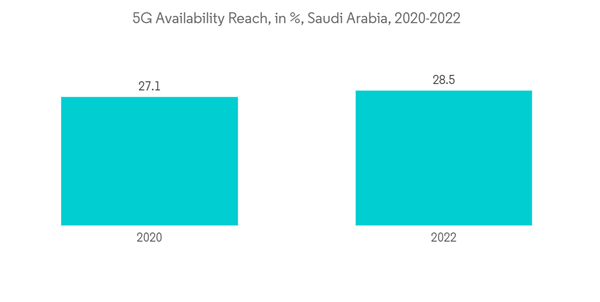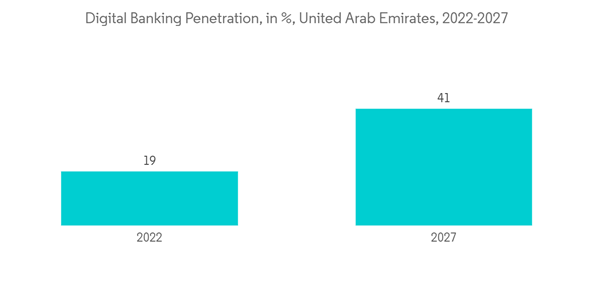Key Highlights
- The Middle East is witnessing an expansion in tower infrastructure sharing to reduce costs and improve network coverage. A few years back, Saudi Telecom Company (STC) and Zain Saudi Arabia announced an agreement to share their network infrastructure, including telecom towers. The Middle East is also beginning to increase local capacity to improve routing efficiencies. With the increase in data center infrastructure, the demand for networking solutions is expected to increase.
- The upcoming IT load capacity of the Middle East data center construction market is expected to reach 2,059.5 MW by 2029. The region's construction of raised floor area is expected to increase 9.7 million sq. ft by 2029.
- The region's total number of racks to be installed is expected to reach 496K units by 2029. Saudi Arabia is expected to house the maximum number of racks by 2029.
- There are close to 26 submarine cable systems connecting the Middle East, and many are under construction. One such submarine cable that is estimated to start service in 2024 is Blue, which stretches over 4,696 km with a landing point in Tel Aviv.
Middle East Data Center Networking Market Trends
IT and Telecom to Hold Significant Share
- Telecom providers are primarily responsible for driving content delivery and facilitating mobile and cloud services, and that's why telecom data centers require very high connectivity. The main factors driving market growth in the region are the establishment of mobile virtual network operators (MVNO), the expansion of fiber-based networks and fixed broadband services, and the achievement of telecom sector liberalization.
- Telecom suppliers are encouraged to invest in the data center business by quickly rising 4G adoption and the impending 5G wave. In the United Arab Emirates, there were about 18.7 million active mobile phone subscribers as of March 2022, according to the Telecommunications Regulatory Authority (UAE). This figure shows a slight rise from December 2020.
- Saudi Arabia's 5G users achieved the fastest 5G peak download speed globally, outpacing South Korea's performance by 11%, at 862.6 Mbps. Once 5,358 new ones are built, there will be 12,302 5G towers nationwide by the end of the year. This number is anticipated to increase as more spectrum is available for commercial use and more people desire quicker internet services.
- In terms of innovations, in February 2022, Etisalat successfully tested the FTTR solution with Huawei, providing a superior customer experience of the solution's capabilities. The successful testing of the FTTR solution has established yet another milestone in the networking industry, showing next-generation end-user experience.
- Also, in March 2021, the Kingdom of Saudi Arabia's Communications and Information Technology Commission (CITC) formally announced plans to make 1200 megahertz (MHz) of the 6 gigahertz (GHz) wireless spectrum accessible for unlicensed use. Intel and Broadcom, in collaboration with the Wireless Broadband Alliance, contributed to CITC's historic decision by working together on Wi-Fi 6E router-to-PC trials, which demonstrated the multi-gigabit speeds possible when leveraging the additional seven 160 MHz channels available in the 6 GHz band.
UAE to Hold Significant Growth
- The major growth drivers for the UAE data center networking market include increasing demand for cloud storage and an increasing amount of data around the UAE. At the start of 2022, the internet penetration rate in the United Arab Emirates was 99.0% of the total population. The UAE ranks sixth in terms of digital banking adoption.
- Australian financial comparison website Finder says that the number of UAE residents using digital banking will increase by 22 percentage points by the end of 2027. Digital bank account adoption is expected to reach 34% by 2023. With an increase in digital banking, the demand for data center construction will likely increase.
- UAE-IX in Dubai is the largest carrier and data center-neutral Internet Exchange for the Middle East. UAE-IX is supporting surging IP traffic growth and enabling optimized end-user experiences during this unique and challenging time. More than 70 peering partners are able to exchange traffic on the IX and offer end users an optimized experience when using their applications and services. Datamena manages UAE-IX in partnership with DE-CIX.
- The region is witnessing significant investments in line with transforming the economy toward digitalization. Owing to such increasing investments, various enterprises are moving to offer their solutions in the region. For example, Avaya Holdings Corp. and Microsoft have collaborated to bring cloud-based services to the Gulf Cooperation Council (GCC), including the UAE. Thus, the increasing adoption of cloud-enabled applications is expected to increase the demand for application delivery controller solutions in the market.
Middle East Data Center Networking Industry Overview
The Middle East Data Center Networking market is currently characterized by fragmentation among various players, each striving to gain a competitive advantage in recent years. Key industry leaders in this landscape include Huawei Technologies Co. Ltd., Cisco Systems Inc., and F5 Networks Inc., among others. These prominent players, boasting significant market shares, are dedicated to extending their customer reach throughout the region. They employ strategic collaboration efforts to enhance their market presence and drive profitability.In January 2022, TP-Link Corporation Ltd. announced the launch of the Archer AXE75, an AXE5400 Tri-Band Gigabit Wi-Fi 6E router. This advanced router is designed to offer a wide coverage area and outstanding performance, bolstered by the inclusion of the HomeShield security system and a robust chipset.
Additional Benefits:
- The market estimate (ME) sheet in Excel format
- 3 months of analyst support
This product will be delivered within 2 business days.










